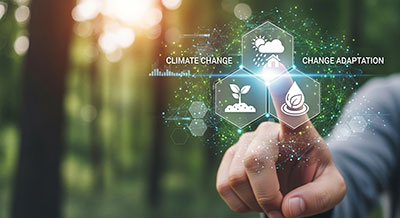Redefining climate change: An evidence-based approach to mitigation and adaptation

The importance of scientific evidence
Scientific evidence provides a solid foundation for understanding the complexities of climate change. It allows us to identify the most pressing issues, predict future trends, and develop targeted, practical solutions. By leveraging data from climate models, environmental studies, and technological advancements, we can create comprehensive strategies that address the root causes of climate change and its multifaceted impacts.
Adaptation measures vary by region and sector, but the need to adapt is universal. The question is, how can we do so wisely? Three areas to focus on include:
Mitigating greenhouse gas emissions. One of the primary goals of an evidence-based approach is to reduce greenhouse gas (GHG) emissions. By analyzing emission sources and identifying the most effective reduction methods, Hatch experts can help industries transition to cleaner energy practices. This includes adopting renewable energy technologies, improving energy efficiency, and implementing carbon capture and storage solutions.
For mining, energy, and other hard to abate industries it’s imperative to reduce reliance on fossil fuels while assuring access to reliable energy sources. This can be done by integrating renewable energy sources, adopting carbon capture and storage (CCS) technologies, replacing coal or diesel-powered facilities and machinery, and optimizing processes, upgrading equipment, and using advanced monitoring systems to track and manage energy consumption.
Adapting to climate change impacts. Experts develop resilience strategies to cope with the inevitable changes in our environment. This involves assessing vulnerabilities, planning for current and future extreme weather events and modifying infrastructure to withstand new climate realities. By proactively adapting, we can minimize the adverse effects of climate change on our operations and communities.
Considerations for environmental impacts occur at every stage, from material extraction and manufacturing to construction, use, and end-of-life for the infrastructure sector is instrumental in adapting to climate change. Sustainable building materials, such as low-carbon cement, recycled steel, and aluminum, can minimize the environmental impact of construction activities.
Achieving a cleaner energy landscape. Ultimately, the goal is to achieve a cleaner energy landscape that supports sustainable development. This requires a business lens to be applied to collaboration between industries, governments, and communities, and to be guided by scientific evidence and expert advice. By prioritizing innovation and sustainability, we can pave the way for a future where economic growth and environmental stewardship go hand in hand.
To effectively minimize the impact of climate change, it’s crucial to seek experts with deep technical and practical knowledge. These professionals bring a wealth of knowledge and experience, enabling them to design and implement innovative solutions tailored to specific industries. Whether it's mining, energy, or infrastructure, expert guidance ensures that solutions are both practical and impactful.
By focusing on a scientific, evidence-based approach and leveraging our expert’s knowledge, we redefine the response to climate change. This strategy enhances the ability to mitigate emissions and adapt, and ensures a cleaner, more sustainable future.
Learn more about Climate Change and explore our Sustainability progress.
